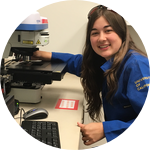
Jackie Lang
UC Davis Department of Veterinary Medicine and Epidemiology - One Health Institute - Karen C. Drayer Wildlife Health Center - UC Davis Department of Agricultural and Environmental Chemistry
Research Associate
More
I have always been fascinated by pollution in aquatic ecosystems because I grew up along the Ohio River, one of the most polluted rivers in North America. I spent my summers collecting trash along streams, catching fish (but not eating any), and wishing I could swim in the river without occasionally developing a rash.
I received my B.S. in environmental toxicology from UC Davis, where I learned from world-leaders in topics like pesticide residues in table crops and the toxicity of hydrocarbons after large oil spills. This inspired me to complete a summer research project at the UC Davis Bodega Marine Laboratory on the toxic effects of oil dispersants to hydrocarbon-degrading microbial communities.
After graduating, I returned to the Ohio River where I completed an internship in aquaculture and biological monitoring before accepting a position as an aquatic ecotoxicologist at an environmental consulting firm. I gained extensive experience in marine and freshwater aquatic toxicity testing and sediment toxicity testing.
Since 2018, I have been employed as a Research Associate in Dr. Jenessa Gjeltema's HEAL (Health Effects of Anthropogenic Litter) lab at UC Davis. I have become an expert on microplastic extraction and analysis using Raman spectroscopy - the gold standard method for chemically identifying the smallest microplastics. Our work on method development for semi-automation of our Raman confocal microscope was presented at the Society of Environmental Toxicology and Chemistry North America annual meeting in 2019. We have a manuscript in progress reviewing scientific literature for everything that is currently known about the presence and health effects of microplastics in marine mammals.
I am very excited to be starting my graduate studies in agricultural and environmental chemistry in Fall 2020. I intend to research the interactions of other pollutants with microplastics as well as the leaching of plastic additives from microplastics into aquatic environments.
August 2020